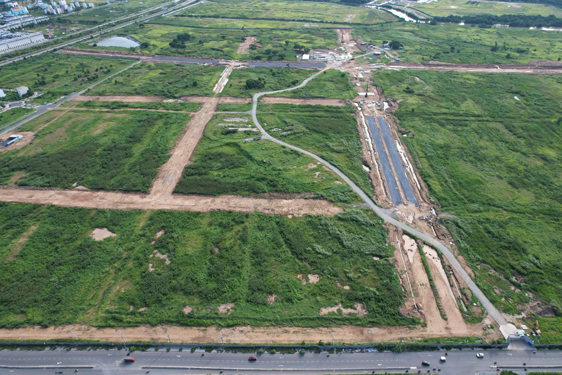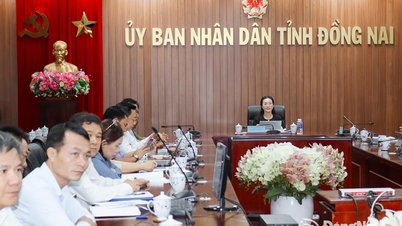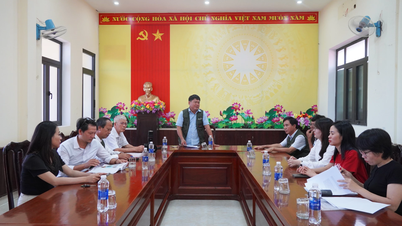During a meeting with voters in Hanoi before the 10th session of the 15th National Assembly on September 30, General Secretary To Lam spent a lot of time talking about land issues. The General Secretary pointed out the fact that the State manages the prices of gasoline, electricity and many other goods, but the land price is assigned to councils and consulting companies to set prices according to the market. This leads to market manipulation, price inflation, causing difficulties for people's lives.
Many shortcomings in management
The General Secretary pointed out that there are very small, interspersed plots of land that cannot be used for anything, but when auctioned, "land brokers" push the prices up so high that thousands of hectares of land next to theirs are sold at very high prices. From there, the General Secretary said that the amendment of the Land Law and the Planning Law must ensure effective and equal land use.

A plot of land in the suburbs of Ho Chi Minh City but now has a very high selling price compared to a few years ago
In fact, in recent years, there have been many cases that have become expensive lessons. Typically, in the land auction in Soc Son (Hanoi) in 2025, Pham Ngoc Tuan paid up to 30 billion VND/m2, hundreds of times higher than the actual price of just over 40 million VND/m2. After winning the auction, this subject abandoned the deposit and was eventually sentenced to 3 years in prison for violating regulations on property auctions. Or in Thanh Oai (Hanoi), in February this year, the "price inflation" trick also recurred when 54 plots of land with an area of over 4,400 m2 were pushed up to double the starting price, and then a series of speculators abandoned the deposit, causing further chaos in the market.
Not only land prices, the housing market in many localities, especially Hanoi and Ho Chi Minh City, also witnessed unbelievable price fevers.
There are many reasons pointed out, from speculation, price inflation, to scarce supply due to prolonged legal problems, slow determination of land use fees, causing investment costs to increase and final selling prices to skyrocket.
Mr. Vo Huynh Tuan Kiet, Director - Head of Housing Project Marketing Department of CBRE Vietnam, said that the major changes after Ho Chi Minh City merged to become a megacity have brought about a strong wave of investment. The development of transport infrastructure, especially the metro system, ring roads, and the urban development model oriented towards public transport (TOD) has increased the attraction of foreign capital into the real estate market. "However, combined with the adjustment of land prices and tax policies related to real estate, the market has established a new price level, especially in suburban areas" - Mr. Kiet analyzed.
Building a national standard land price framework
In fact, land prices have always been one of the factors that strongly affect the real estate market, as well as directly affect economic and social life. Unreasonable fluctuations, speculation and group interests have distorted the market, making it difficult for people and businesses. Many experts believe that this is the time to need a transparent, scientific and synchronous mechanism to bring land prices back to their true value, creating a foundation for sustainable development.
Dr. Nguyen Si Dung, former Deputy Head of the National Assembly Office, said that the most fundamental solution is to build a national standard land price framework. "An independent national land price council needs to be established, issuing a price framework based on big data, with expert consultation and close supervision. It is impossible to let each locality set its own prices, because the risk of group interests is very high," he emphasized.
At the same time, the construction of a unified land database nationwide is a key task. This system must fully record transactions, tax and credit information in real time, helping to accurately reflect supply and demand and eliminate virtual transactions that are a "playground" for speculation.
According to Dr. Nguyen Si Dung, to eliminate the motive for speculation, the State needs to apply anti-speculation tax, progressive tax on abandoned land or short-term transactions. In addition, the mechanism for recovering land rent differences also needs to be seriously implemented, that is, when the State invests in infrastructure causing land prices to increase, that added value must belong to the entire population through taxes, fees or auctions, and cannot flow into the pockets of a group of individuals. He also proposed allowing civil transaction prices to differ from State prices within a reasonable range but must have a ceiling, in order to maintain flexibility while still ensuring stability.
Determine land use strategy
From market practice, Dr. Pham Viet Thuan, Director of the Ho Chi Minh City Institute of Natural Resources and Environment Economics, said that the application of the new land price list according to the 2024 Land Law has revealed many shortcomings. "After only one year, the new land price list has increased from 2.3 to 38 times compared to before the law took effect. At the same time, Decree 103/2024 stipulates that 100% tax must be paid when converting land use purpose to residential land, which is beyond the people's capacity, leading to revenue loss and greatly affecting socio-economic development, especially people's livelihood and social security" - he cited.
This expert believes that the reason comes from the unreasonable construction of the land price list according to Decree 71/2024, so it needs to be adjusted. "Determining the land use strategy in macroeconomic regulation is of utmost importance. Therefore, the land price list must be stable in each province and city and the K coefficient needs to be applied for adjustment.
In theory, the K coefficient is a tool for state management of land, helping to limit the amplitude of fluctuations. Therefore, in this revised Land Law, it should be clearly stipulated that the basis for building the new land price list applicable from January 1, 2026 is the land price list before the law takes effect, using the K coefficient to adjust with an increase/decrease amplitude of 3%-5% each time. This approach will contribute to stabilizing the macro economy in the long term," Mr. Thuan suggested.
He also emphasized that land is a means of production and services, so land prices must be in harmony to stimulate investment and create jobs. Limiting speculation is an inevitable trend, because preventing land waste is also a prerequisite for a rich people and a strong country. Instead of pushing up land prices, the State should calculate land and urban construction fees to create a more sustainable source of revenue.
Housing development for real needs
Dr. Nguyen Van Khoi, Chairman of the Vietnam Real Estate Association, emphasized that developing housing for real needs is a sustainable solution, instead of letting the market float on speculation. He analyzed: "It is necessary to promote preferential policies and specific mechanisms for social housing projects and mid-priced commercial housing, while flexibly converting high-end inventory to the real housing segment to avoid wasting resources."
Mr. Khoi also said that legal procedures must be simplified and planning must be transparent, especially during the administrative unit merger phase, so that businesses have a basis for long-term investment. Another issue is controlling risks from slow-progressing infrastructure and suspended projects, which cause great damage to the people.
Mr. Khoi also proposed that the Government soon establish a National Housing Fund and a Local Housing Fund to support capital, regulate supply and demand and develop rental housing. The public-private partnership (PPP) model should be encouraged in developing social housing and satellite infrastructure. At the same time, the mechanism for monitoring and controlling speculation and price inflation must be tightened to ensure "sustainable assets" for the people.
Source: https://nld.com.vn/dua-gia-dat-ve-dung-gia-tri-thuc-196251001210636059.htm











































































































Comment (0)